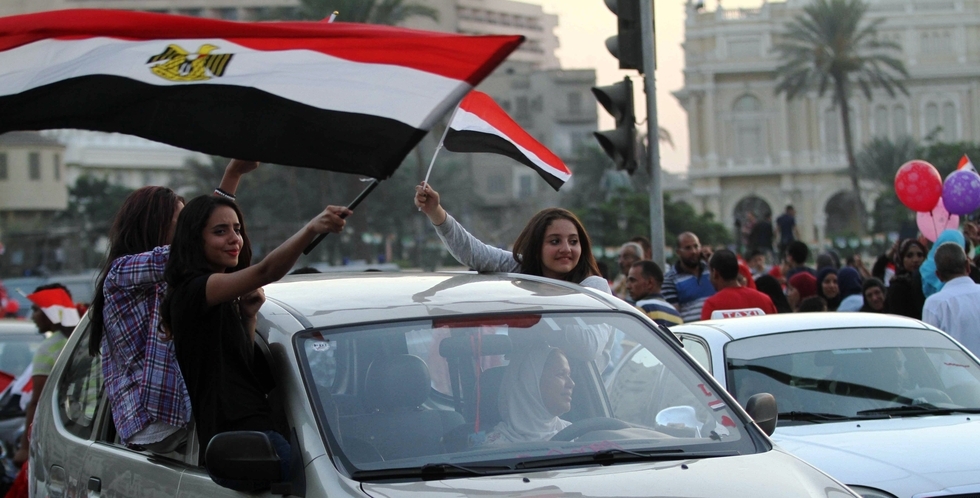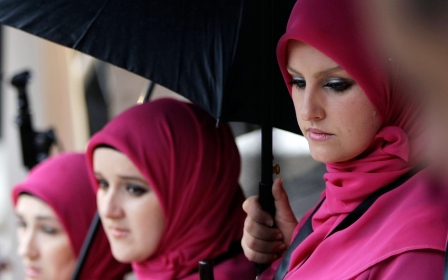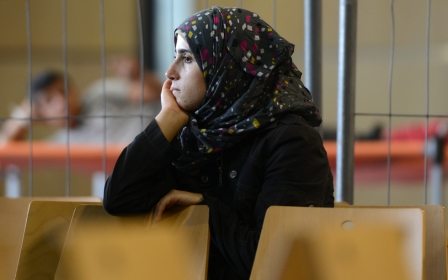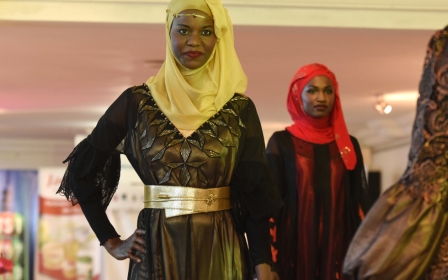
Egypt's embattled feminism: Fighting violence, harassment and FGM under Sisi
Somewhere in Cairo, on a women’s carriage of the metro, a girl wearing her dark hair in a thick plait and another in an emerald green headscarf are telling stories. They talk about the need for truth; they talk about being censured for speaking the truth; they talk about the men who speak to them - uninvited, indefatigable - on the street. Passengers glance at them with interest or gaze beyond, bored or disconcerted. Suddenly, a woman appears at the edge of the shaky video, her niqab a black swathe over one side of the shot, glasses screening panicked eyes. “Are you filming?” she asks, voice strained. “God punishes you! Where is the Metro Security?” The girls keep speaking above the commotion, detailing their exhausting daily negotiations of public space, their weary claim to agency.
The year is 2012. Ripples from the 2011 revolution are coursing through Cairo. Women who joined and spearheaded the protests on the streets - almost half of all participants - are trying to couple a social revolution to the political upheaval that succeeded in ousting Hosni Mubarak and securing popular elections. In the general euphoria sweeping the country, initiatives promoting gender equality have sprung up or gained strength: BuSSy, the women-driven storytelling group responsible for the scene on the metro, is one such project, dedicated to giving voice to otherwise untold stories.
But already there is trepidation within the feminist movement: fears that gains will be fleeting, that a country where women routinely face harassment, violence and discrimination - and where high illiteracy rates, low employment numbers and an entrenched wage gap obstruct economic equality - will revert to the oppressive status quo, or circumscribe the hard-won freedoms Egyptian women have glacially gained.
Hostile climate
The intervening years - whiplash-inducing in the velocity of their political change - have done little to diminish that scepticism. In 2013, mass public sexual assaults at anti-Morsi protests swiftly stymied the narrative of progress, and Egypt was deemed the worst country for women in the Arab region. Despite symbolic advances under Abdel Fatah el-Sisi, some argue that the removal of the Muslim Brotherhood has done little to improve things. “Honestly, for feminists and for women’s issues, it’s all depressing,” Mozn Hassan, a prominent human rights defender, said with a bitter chuckle during a recent conversation. “It’s really, really hard to create a feminist discourse from within the revolution time. Because this is about: you have a public, and a big question. So people don’t care about women.” Noora Flinkman, of sexual harassment NGO HarassMap, ruefully recalls the general revolutionary zeal. “We were enthusiastic because we thought we were building momentum to bring about a lot of change,” she says. “But then of course everything took a different turn.”
The tense political climate - a result of increasingly curtailed freedoms, bolstered by anti-terror, pro-stability rhetoric - means those working to improve the conditions of women must do so carefully. HarassMap, devoted to a cause (the eradication of sexual harassment, via tracking and advocacy) that the state has expressed support for, pursues their aims warily. “We don’t talk about women’s rights or feminism,” Flinkman tells me, “even though everything we do is about that.” Instead, they prefer to espouse “community-based social change.” Flinkman believes that HarrassMap’s diplomatic approach may account for the number of male volunteers they attract. “In the communities where we work, the terminology is not very well understood,” she says. “[Feminism is] often seen as something foreign, so we feel it won’t really support our cause at all.”
BuSSy, which got its start in 2006 on the America University in Cairo campus, is equally loath to be labelled feminist. Project manager Nadia Elboubkri almost flinches when I mention the word “radical” in reference to the storytelling initiative’s work. “We stay away from politics,” she says. “For us, we don’t take a stance on anything because the stories speak for themselves, so we don’t really need to.” She later clarifies: “All we do is make sure [the storyteller’s] voice is heard, no labels, tags, or stigmas attached. This is how we keep the project as inclusive as possible.” Yet BuSSy, which holds storytelling workshops across the country, culminating in thematic performances, undoubtedly performs a social function. “It’s not only about the art,” Sally Zohney, a feminist activist and BuSSy storyteller, explains. “It’s about breaking the silence, about sharing and connecting people.”
During workshops, men and women relate stories dealing with harassment, sexual abuse, “honour” killings, domestic violence, being single. In its low-key way, the project dismantles hegemonic narratives, legitimising often stigmatised experience. “I’m very tired of the word 'empowerment',” Elboubkri tells me, “but when you see what the workshops do, the kind of impact that they have on people… Imagine, not being able to talk about something for your entire life, and then walking into a room and being told that you can talk about anything. What comes out is just absolutely amazing. It changes people.”
For Zohney, formerly the violence against women officer for UN Women Egypt, such initiatives broaden the appeal of the movement. Whereas feminist issues were previously shunted around a hermetic cadre, or aimed at an international audience, she sees these “more accessible tools” and their varied subjects as part of the everyday feminism that blossomed in the wake of the revolution. “The topic [of feminism] became no longer elitist and exclusive to closed doors events,” she says.
Laughing about FGM
Even long-standing campaigns have turned to innovative, less didactic methods to spread awareness - as evidenced by a recent comedy show commissioned by the United Nations Population Fund to raise awareness about female genital mutilation. For decades, the state and NGOs have been attempting to make a dent in Egypt’s appalling FGM statistics. Despite a ban on the practice, Unicef reports that 91 percent of Egyptian women are cut (with 77 percent of FGM operations carried out, sometimes lethally, by a medical professional).
Nada Sabet, architect of the FGM comedy, thought laughter might be a route worth trying. Theatre, Sabet tells me, “allows people to not be so guarded…it's very easy to open up safe spaces, where people can just dialogue things as opposed to just try to prove points.” It’s difficult to tell people to change, she reasons, but “once people laugh at what they do, they can’t really pretend that they like it.”
Such initiatives are designed to ease people into the habit of different behaviour by engaging them in a non-judgemental idea-exchange. When I ask Sabet how audiences - often from conservative, rural areas—react to her progressive theatrical treatment of FGM, she sighs heavily, clearly tired of the assumptions the question contains. “They laughed. They clapped at the end. No-one threw stuff at us,” she says. In fact, “we get a lot of people who decide to share their own stories: what they’re thinking of, what they’ve done, what they could’ve done differently, how it’s affected their lives.” Young men who volunteer with HarassMap, Flinkman says, often join because of unreflective, damsel-in-distress notions, “but they come out of it with a very different understanding: it’s about human beings having the rights to be in the street.”
Although cultural outreach initiatives can be effective, it’s clearly impossible to rely on these alone in a country 90 million-strong. Comprehensive policies and legislation are crucial to advancing women’s rights, if only as a means of officially stigmatising previously normalized behaviour. Yet successive post-revolution regimes have fallen short on addressing issues of gender violence and discrimination.
Amnesty International criticised the 2012 constitution as fundamentally ignoring women’s rights: women were barely involved in the drafting process, and references to them dealt primarily with the domestic sphere. The 2014 constitution was consequently heralded as “unprecedented” in this regard, including as it did a commitment to honour international conventions (including those on women’s rights), criminalise discrimination and recognise equality between the sexes. But a parliamentary quota, abolished in 2011, was not reintroduced. In January 2016, 89 women were admitted to Egypt’s parliament, holding 14.9 percent of the available seats - a historic achievement, perhaps, but hardly proportional.
Improving women’s status on paper doesn’t necessarily translate to a better situation in reality. Top-down approaches are liable to be inadequate, resented, ignored, and poorly enforced, said Dr Magda Adly, of the embattled NGO Al Nadeem Centre for Rehabilitation of Victims of Violence, which advocates an end to torture and violence against women. The centre was stormed by security forces under orders from the Health Ministry earlier this year, and ordered to close. Al Nadeem has since issued a legal complaint to the Minister of Health and continues to operate. Adly told me that legislation regarding violence against women is toothless, since it essentially glosses over domestic violence. “We need a multidisciplinary national strategy,” Adly said, “not only some articles in the penal code.”
An Amnesty International 2015 report on violence against Egyptian women (cheerily titled “Circles of Hell”) found that “recent piecemeal reforms, shortfalls in Egyptian laws and entrenched impunity continue to foster a culture of routine sexual and gender-based violence in the country.”
Harrassment no longer taboo
The campaign against sexual harassment exemplifies the potential effectiveness of collaboration between NGOs and the state, and also the shortfalls of legislative change. Harassment is an insidious problem in Egypt: over 99.3 percent of women have reportedly experienced harassment - the number seems high until, as a woman, you walk through downtown Cairo, an experience that makes you wonder what the other 0.7 percent had done to avoid the persistent catcalls, ass-grabs, urgent whispers and aggressive abuse that constitute a casual stroll through the packed metropolis. In the proactive enthusiasm of 2011, scrappy groups sprang up to deal with this issue, reporting on incidents and campaigning for action. In 2014, after intensive workshopping by over 25 groups, a new law was finally passed, criminalising harassment with penalties such as elevated fines and jail time.
Zohney considers the collaboration between police, judiciary and government bodies - in response to civil society pressure - at least a partial success. “The topic is no longer a taboo,” she says, “this is the triumph.” All the women I spoke with talked of the power of language, and their relief that harassment can now be named - no longer referred to, menacingly, as “flirting”. But the real-world effect is limited. “There was of course no real efforts made to educate the public or the police about this law when they amended it,” Flinkman says, “so very few people know that you can actually be sentenced for sexual harassment.” She is bleakly realistic about the progress made. “What we always feel is that [harassment] was really bad in the past - this is why HarassMap was founded in the first place; it was really bad during those years [of the political crisis]; and it’s really bad now.” Indeed, Flinkman posits that the aggression of such incidents is increasing: as people become inured to public violence, she says, few bother to intervene - apathy that can have horrifying consequences. Reporting around harassment and assault often does little to spread awareness: careless wording and outright misinformation hinder public understanding, reinforcing prejudices.
Women's groups under attack
Meanwhile, media organisations have vilified women’s rights organisations, along with other NGOs, as traitors. Such pandering to state interests and popular paranoia is arguably a function of the pressure journalists themselves are under. In a series of remarkable statements to The Guardian in 2015, Egyptian television hosts said they were happy to function as mouthpieces of the military “out of respect” for the institution. Even the National Council for Women, a government body founded by former First Lady Suzanne Mubarak, has contributed to the slander. “The council does not involve itself in defending women arrested during the break up of the sit-in. They are not Egyptians because they belong to international and Islamic groups,” then-president Mervat Tallawy said in 2013, of women arrested during an anti-military protest. “[T]his [civil society] is the new weapon they [the West] are using to topple the state.”
Despite such aspersions, Dalia Ziada, human rights activist, blogger and member of the National Council of Women’s foreign affairs committee, tells me “there has always been strong cooperation between NCW and independent NGOs.” With their grassroots credentials and flexibility, civil society is essential in transforming policy changes NCW champions into action on the ground, she says. The administration “is very much on our side,” and willing to advance women’s rights “whenever the opportunity arises.” Since gaining power, President Sisi has made a point to meet with women’s groups, speak publically on issues like sexual harassment, and appoint a handful of women to high office.
But the government’s eagerness to claim women-friendly credentials has been met with suspicion. An anonymous essay printed by the Egyptian Institute for Personal Rights denounces “the vigorous attempt to reconstitute state feminism - that is, the attempt to portray the state as a supporter of women’s rights to spruce up its image and conceal other state crimes,” setting the NCW in opposition to a grassroots feminist coalition. “It’s very, very difficult to function as an NGO trying to address this issue [of sexual harassment] or any other social issue,” Flinkman tells me. “There’s not that openness where you can partner with government institutions or huge organisations to get your issue out.” As human rights researcher Nicola Pratt wrote, in an essay for OpenDemocracy, the state has offered women a painful deal: the enshrinement of their rights writ large, in exchange for forfeiting the right to independently organise.
Challenging patriarchy
Such a pact makes progress challenging, since to change attitudes and practices, women’s rights campaigners need to push for broad-based support. The activists I spoke with highlighted Egypt’s patriarchal status quo as a major impediment to progress on gender discrimination, with varying opinions as to whether religious rhetoric or embedded social conservatism was at the root of this entrenched inequality. But they unanimously rejected the notion that such conservatism is so deeply rooted as to be unshakeable. “I honestly think that it’s not the thing has been perceived internationally, that this country is so closed, people are not accepting [new ideas],” Mozn Hassan told me. “While opening questions with people, you found that people could be changed.”
Indeed, engaging people in conversation can be extraordinarily effective at shifting attitudes on social issues, but if you don’t have the right to engage - if public space is unavailable, if your activities are suspect - beginning such a conversation is difficult. Under Sisi, restrictions on freedom of assembly have been enshrined in draconian protest laws, while rigid anti-terror legislation has been wielded effectively against NGOs.
The byzantine bureaucracy that organisations are required to negotiate to legitimise their activity makes them beholden to the Ministry for Social Solidarity - which recently established a new body solely to monitor foreign NGOs. Zohney highlights “the crackdown on women groups and NGOs, the security risks,” as “serious challenges to achieving more results.”
Hassan, the founder and executive director of Nazra for Feminist Studies, an NGO dedicated to advancing women’s rights, has been directly targeted in this crackdown. She is currently banned from travel, pending the results of an investigation into Nazra’s finances. The organisation is one of many NGOs implicated in Case 173 (the “Foreign Funding” case), condemned by critics as a means of stifling Egypt’s beleaguered civil society. The maximum sentence Hassan faces is 25 years. “Being a feminist is a hard journey,” she says, taking contemplative draws on a hookah pipe, in a café in one of Cairo’s fashionable neighborhoods. “But 25 years is so hard.”
The investigation, Hassan says, serves as a warning: “a clear message that feminist work is not something soft and nice.” Nazra has consistently chosen to eschew a conciliatory approach, having been outspoken on controversial issues, unswervingly political in their pursuit of women’s rights in the public sphere, and critical of the government. “We are a group that is believing that the feminism question is a political question, and we think that we are in the heart of the political democracy movement,” Hassan says. “Honestly, I’m not regretting [our approach]. I think that we had a historical time, and we did what we believed in. I know that we are paying the price.”
Even depoliticised initiatives face censorship. BuSSy has been prevented from performing, or asked to modify content, and Elboubkri is aware of their precarious situation. “We’re trying to do as much as we can, while we can,” she says. “We don’t take anything lightly and we don’t take anything for granted. We know there’s a stark possibility that the space that we work in could be even more limited as time goes on, or closed off completely. So it’s just important for us to continue working and continue getting the stories out publicly.”
Given that Egyptian authorities have allegedly disappeared hundreds of activists over the last year, the fear of getting on the wrong side of the government is understandable. As Dr Adly, of the Nadeem Centre, puts it: “The state decided to shut all mouths except her one.” The international community - including the US and European governments, eager to keep Egypt on side in the anti-terrorism effort - has also chosen to mostly keep its mouth shut, even as Sisi’s crackdown intensifies.
Unity amid adversity
Under pressure as women’s rights groups are, solidarity within their ranks (self-identifying as feminist or otherwise) is essential - a reality that Hassan champions, and that flies in the face of the popular image of feminism as a divided house. “Having different people using different tools is the movement,” she tells me. “I’m not obsessed by being united...this is about the feminist movement generally: that you have radical feminists, you have cultural feminists, you have Islamist feminists, you have socialist feminists. But, at the end, all of those people are feminists, using different tools, having different priorities.” The diversity of female experience in Egypt, Hassan says - the many visions of what equality and freedom might mean - enriches rather than weakens the movement.
The women I speak with share a defiant, pragmatic sense of hope. “Since I am still working and do what I can, so I feel that the future is better,” Dr Adly said. Zohney shuns pessimism, citing the contribution of Egypt’s “active everyday feminists” and apparently increased political will. Besides, Hassan says, it’s not possible to turn back the clock. “Maybe it will take a longer time, the sacrifices will be higher. But you couldn’t go back to the 50s and 60s by jailing thousands of people - even if they think about it, it’s hard for them.”
Exhausted as she is by the thought of a long jail sentence, by her uncertain present, and the protracted legal battle that is no doubt in store, Hassan believes change is possible. “One of the things we were obsessed about - and honestly this is hard on my heart now,” she says, in the quiet of the café, “is that we think that you can mainstream feminism, when you have a public space. Not while you are stigmatised as a spy.”
- Kirsten O'Regan holds a Journalism Masters from New York University's Cultural Reporting and Criticism programme. Her writing has appeared in a number of publications.
The views expressed in this article belong to the author and do not necessarily reflect the editorial policy of Middle East Eye.
Photo: Egyptian women wave their national flags during celebrations in Cairo's landmark Tahrir Square on 6 August, 2015 (AFP).
Middle East Eye propose une couverture et une analyse indépendantes et incomparables du Moyen-Orient, de l’Afrique du Nord et d’autres régions du monde. Pour en savoir plus sur la reprise de ce contenu et les frais qui s’appliquent, veuillez remplir ce formulaire [en anglais]. Pour en savoir plus sur MEE, cliquez ici [en anglais].




